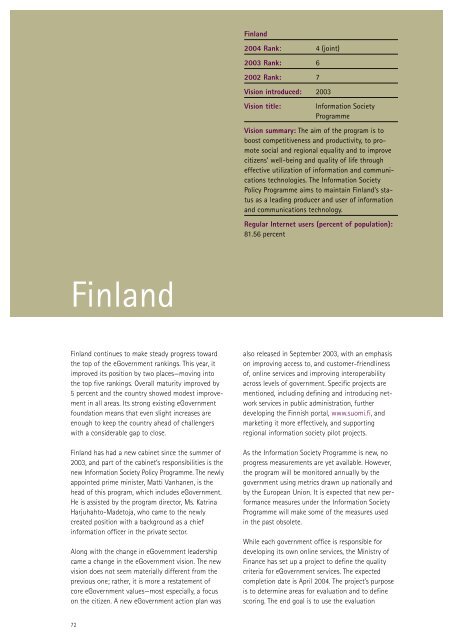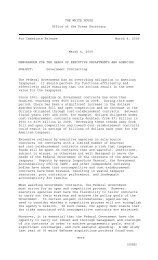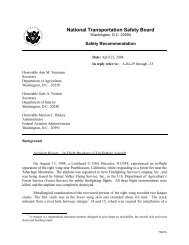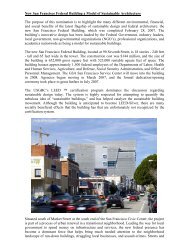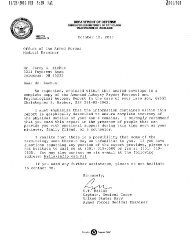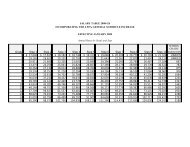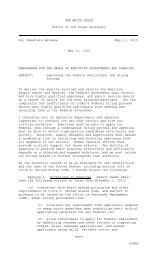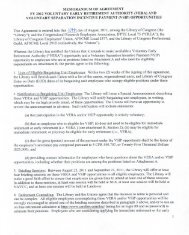Accenture's fifth annual global e-government study
Accenture's fifth annual global e-government study
Accenture's fifth annual global e-government study
You also want an ePaper? Increase the reach of your titles
YUMPU automatically turns print PDFs into web optimized ePapers that Google loves.
Finland<br />
2004 Rank: 4 (joint)<br />
2003 Rank: 6<br />
2002 Rank: 7<br />
Vision introduced: 2003<br />
Vision title:<br />
Information Society<br />
Programme<br />
Vision summary: The aim of the program is to<br />
boost competitiveness and productivity, to promote<br />
social and regional equality and to improve<br />
citizens’ well-being and quality of life through<br />
effective utilization of information and communications<br />
technologies. The Information Society<br />
Policy Programme aims to maintain Finland’s status<br />
as a leading producer and user of information<br />
and communications technology.<br />
Regular Internet users (percent of population):<br />
81.56 percent<br />
Finland<br />
Finland continues to make steady progress toward<br />
the top of the eGovernment rankings. This year, it<br />
improved its position by two places—moving into<br />
the top five rankings. Overall maturity improved by<br />
5 percent and the country showed modest improvement<br />
in all areas. Its strong existing eGovernment<br />
foundation means that even slight increases are<br />
enough to keep the country ahead of challengers<br />
with a considerable gap to close.<br />
Finland has had a new cabinet since the summer of<br />
2003, and part of the cabinet’s responsibilities is the<br />
new Information Society Policy Programme. The newly<br />
appointed prime minister, Matti Vanhanen, is the<br />
head of this program, which includes eGovernment.<br />
He is assisted by the program director, Ms. Katrina<br />
Harjuhahto-Madetoja, who came to the newly<br />
created position with a background as a chief<br />
information officer in the private sector.<br />
Along with the change in eGovernment leadership<br />
came a change in the eGovernment vision. The new<br />
vision does not seem materially different from the<br />
previous one; rather, it is more a restatement of<br />
core eGovernment values—most especially, a focus<br />
on the citizen. A new eGovernment action plan was<br />
also released in September 2003, with an emphasis<br />
on improving access to, and customer-friendliness<br />
of, online services and improving interoperability<br />
across levels of <strong>government</strong>. Specific projects are<br />
mentioned, including defining and introducing network<br />
services in public administration, further<br />
developing the Finnish portal, www.suomi.fi, and<br />
marketing it more effectively, and supporting<br />
regional information society pilot projects.<br />
As the Information Society Programme is new, no<br />
progress measurements are yet available. However,<br />
the program will be monitored <strong>annual</strong>ly by the<br />
<strong>government</strong> using metrics drawn up nationally and<br />
by the European Union. It is expected that new performance<br />
measures under the Information Society<br />
Programme will make some of the measures used<br />
in the past obsolete.<br />
While each <strong>government</strong> office is responsible for<br />
developing its own online services, the Ministry of<br />
Finance has set up a project to define the quality<br />
criteria for eGovernment services. The expected<br />
completion date is April 2004. The project’s purpose<br />
is to determine areas for evaluation and to define<br />
scoring. The end goal is to use the evaluation<br />
72


